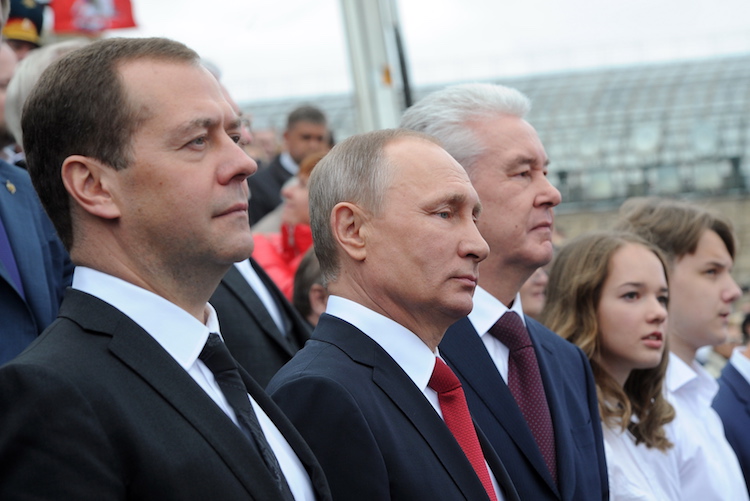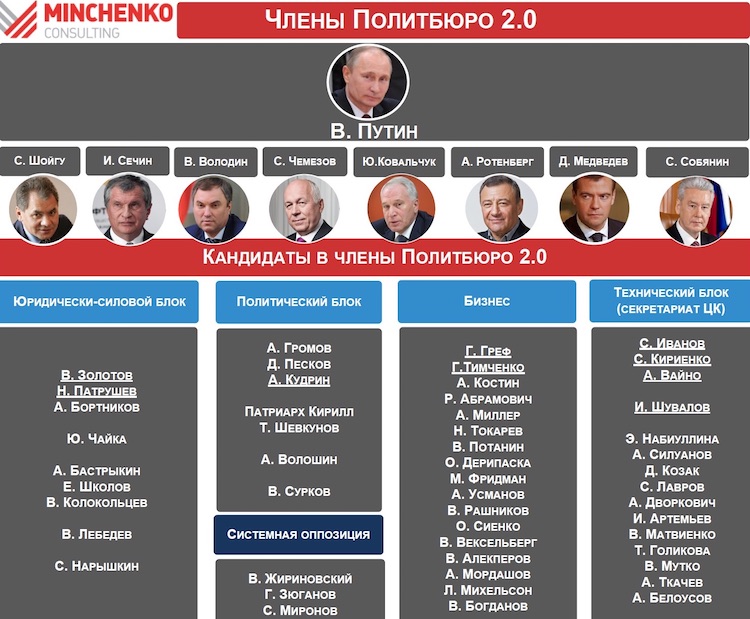In its latest report on the situation inside the Russian elites, Minchenko Consulting Group details the recent elite reshuffling and gives an assessment of the change in influence and hierarchy standings of individual elite members. IMR summarized the main findings of the report below.

Left to right: Russia's Prime Minister Dmitry Medvedev, President Vladimir Putin, and Moscow Mayor Sergey Sobyanin. Photo: Mikhail Klimentyev / TASS
- Minchenko Consulting continues its series of Politburo 2.0 reports on the power factions inside the Putin regime.
- Politburo 2.0 currently includes: Defense Minister Sergei Shoigu, head of Rosneft Igor Sechin, chairman of the State Duma Vyacheslav Volodin, head of Rostec Sergei Chemezov, chair of Rossiya Bank Yuri Kovalchuk, businessman Arkady Rotenberg, Prime Minister Dmitry Medvedev, and Moscow Mayor Sergei Sobyanin.
- The authors of the report argue that despite economic turbulence caused by sanctions and low oil prices, the so-called “Crimea consensus” prevails among the Russian elites.
- The recent reshuffling is not a feud inside the elites, but rather a conscious plan aimed at resolving the potential conflict between two factions of the “Politburo”— one in the Kremlin (administration) and the other in the government (executive branch).
- Still, there are several factors that currently reinforce competition inside the elites:
- Shrinking resource base, need for ideological renewal, and development of new methods of redistribution of the resources;
- International instability, friction with the West, demand for “de-conflicting” on the side of both the Kremlin and the public;
- Upcoming presidential elections (2018) and consequent redistributions of benefits and positions;
- Putin’s willingness to independently shape his campaign coalition and develop future power structures.
- To deal with all these challenges, Putin needs a smaller, less costly and more efficient government. At the moment he is testing out various recruiting strategies. The authors suggest that Putin’s first presidential term was chosen as a model, with its agenda of liberal reforms and normalization with the West.
- Some of the elite factions that are being tested during this new recruiting process are:
- young technocrats (e.g. Anton Vaino, new Chief of Staff of the Presidential Administration; Denis Manturov, Minister of Trade and Industry; Alexander Novak, Minister of Energy);
- “princes” (younger family members of the ruling elite: e.g. Andrey Murov, chairman of the Federal Grid Company of the Unified Energy System, son of Yevgeny Murov, former head of the Federal Protective Service; or Boris Kovalchuk, chairman and CEO of InterRAO, son of Yury Kovalchuk);
- close circles (appointing former bodyguards to governor positions: e.g. Aleksey Dyumin as governor of the Tula region);
- young members of Politburo, e.g. Sergei Kiriyenko, new Deputy Chief of Staff of the Presidential Administration; Leonid Mikhelson,CEO and chairman of Novatek gas company; Aleksei Mordashov, chairman of Severstal);
- candidates to Politburo members (e.g. Deputy Prime Minister Dmitry Kozak, Yuri Trutnev, Minister of Natural Resources and the Environment);
- managers of the increasingly important economic sectors (Deputy Prime Minister Vitaly Mutko for sport; Minister of Agriculture Alexander Tkachev);
- public and party activists (including members of the systemic opposition).
- The report points out that in recent months the positions of Sergei Chemezov, who leads Rostec State Corporation, have strengthened, while Dmitry Ragozin, who oversees the defense sector in the government, has been losing influence.
- Another faction that has been gaining momentum is led by Yuri Kovalchuk. This group includes Sergei Kiriyenko, whose promotion played a role, and also works closely with Putin’s economic advisor Alexei Kudrin supporting his economic program.
- Dmitry Medvedev’s image received a positive boost following United Russia’s decisive win in the parliamentary elections; however, his faction has been weakened by the appointment of new people to his cabinet—Education Minister Olga Vasilyeva and Sports Minister Pavel Kolobkov.
- Igor Sechin increased his informal influence through Rosneft’s acquisition of Bashneft that largely went on Sechin’s terms; but he lost a few proxies in the power agencies (FSK and FSO) due to staff purges and restructuring.
- Sergei Shoigu and Arkady Rotenberg maintain their influence, although, like all members of the “old guard,” they remain prone to “elite purges.”
- Vyacheslav Volodin, former deputy chief of staff and the current Duma chairman, may play an important role in readjusting the new Duma, potentially strengthening it to counterbalance the government; still, with this transfer, his formal administrative influence has decreased.
- Sergey Sobyanin is viewed as one of the candidates for future prime minister; he is seen as an accommodating figure by most elite members, but with Moscow mayoral elections coming up in 2018 (the same year as the presidential elections), he will be forced to set his priorities straight.
- Among other prominent members of the elite whose “stocks” are going up are: Valery Zolotov, head of the National Guard; Nikolai Patrushev, secretary of the National Security Council; Yuri Chaika, Prosecutor General; Anton Siluanov, Finance Minister; German Gref, Sberbank chairman and CEO; Alisher Usmanov, founder of USM Holdings; Aleksey Gromov, First Deputy Chief of Staff of the Presidential Administration; former Finance Minister Aleksey Kudrin, who is also considered for the prime minister’s office and the author of the economic plan that Putin may use in his re-election campaign in 2018.
- Next year’s issues for the Politburo will include:
- Stiffer competition in the wake of the presidential election and more intense media wars;
- Finding people inside the elite who can do international outreach and help improve relations with the collective West;
- Re-establishing relations with the United States, Germany, and France following the elections in these countries;
- Continuation of the “soft” purges in the “old guard” (similar to the reassignments of Sergey Ivanov, Mikhail Fradkov, and Sergey Naryshkin this year), preserving their loyalties while at the same time clearing space for the future “redistribution of the rewards.”
Минченко-консалтинг: «Политбюро 2.0: демонтаж или перезагрузка?», 7 ноября 2016 г.
Members of the Politburo 2.0

Source: Minchenko Consulting

